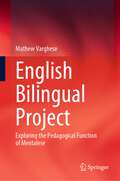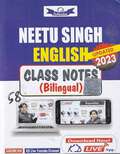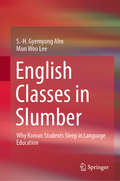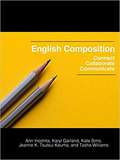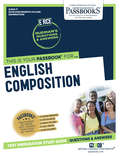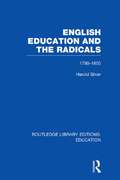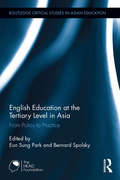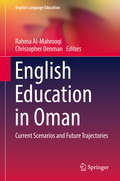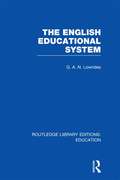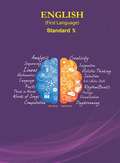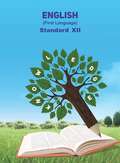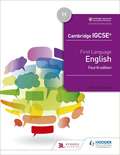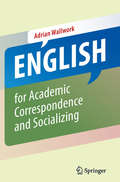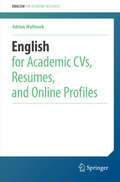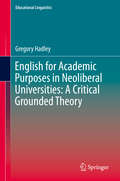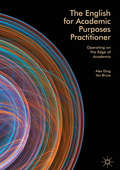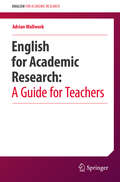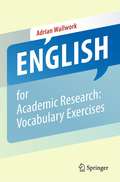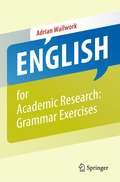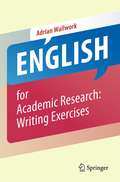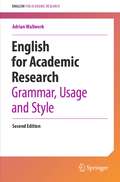- Table View
- List View
English Bilingual Project: Exploring the Pedagogical Function of Mentalese
by Mathew VargheseToday, English is the global lingua franca and competent English communication skills should be one of the rights of all educated individuals irrespective of any socio-cultural limits. By introducing a new method, this book focuses on helping any learner to get sufficient communication skills in English as much as in the native language. This method helps one to avoid translating from mother tongue to English. And by using the method of thinking in English, one could acquire the required English bilingual skills naturally. The method is founded on the philosophical idea of mentalese—mind language as the base language of thinking available for humans for constructing thoughts. The proposed English Bilingual Project (EBP) helps one to transfer thoughts from a structureless mentalese to the grammatical structure of any language English/Japanese/Chinese. The method described in this book works in two ways: one it helps one to intuitively understand the working of mentalese; the other is by practicing think in English with the mentalese, one could generate the bilingual brain. The main procedure for transferring thoughts from the mentalese to English is through writing one’s thoughts. This helps one to think effectively in English like one’s own mother tongue. This method works as a prime requirement model for one to generate multilingual skills. The book resourced the idea of mentalese from the classical philosophy, reflects it with the modern generative theories, links it with the studies in neuro-linguistic studies on bilingualism and the bilingual brain.
English class 11 - GSTB
by DJ.agdisJoshi Dr. Sandeep Bhatt Shri Rajesh Mehta Shri Kirtibhai Trivedi Shri Dinesh Majithiya Shri Tejas Trived Shri Anna Ashirvadita sachaGujarat State Board of School Textbooks has prepared new textbooks as per the new cuticular developed by the Gujarat State Secondary and Higher Secondary Board and which has been sanctioned by the Education Department of the Government of Gujarat. The textbooks of Standard - 1 to 12 are in accordance with the guidelines of N.C.F. (National Curriculum Framework) and theN .C.E.R. T.
English Class 6 - Nepal
by Curriculum Development Centre Nepal Curriculum Development CenterThis accessible book has been published by ADRAD Nepal, with support of Australian Aid. All rights reserved. No part of this publication may be reproduced, stored in a retrieval system or transmitted, in any other form or by any means for commercial purpose without the priorpermission in writing of the Curriculum Development Centre.
English class 8 - GSTB: અંગ્રેજી વર્ગ 8 - જીએસટીબી
by Gstbઆ પુસ્તક ધોરણ 8 નું (પ્રથમ સત્ર) અંગ્રેજી વિષય નું પાઠ્યપુસ્તક છે .
English class 9 - GSTB
by Mahendra Chotalia Kiran Chauhan Shri Patel Shri Joshi Shri Bhal Shri Kazi Shri Vyasઆ પુસ્તક ધોરણ નું 9 અંગ્રેજી વિષય નું પાઠ્યપુસ્તક છે .
English Class Notes (Bilingual) - Neetu Singh - Competitive Exam
by Neetu SinghA full course book of English notes for those who want to appear general exams - in English with explanations in Hindi - for English language learners. There are 34 chapters with illustrated examples and previous years questions from main general examinations for different posts.
English Classes in Slumber: Why Korean Students Sleep in Language Education
by Mun Woo Lee S.-H. Gyemyong AhnThis book explains why some Korean high school students sleep during English classes in spite of the emphasized value of English in their society. It examines how this sleeping-in-class phenomenon can be understood by means of such marginalized students’ emic outlooks on themselves, the target language, their teachers, schools, and society/culture; and by means of the views of teachers who have experienced such in-class sleepers. To understand the phenomenon more holistically, it pursues a multi-disciplinary approach drawing on studies of demotivation and amotivation, psychological needs, and student experiences of schooling, as well as sociocultural theories of learning and agency and of interpersonal dynamics, among others. On the basis of a multi-modal analysis of interview data from the student and teacher participants, it theoretically interprets the phenomenon at the classroom (‘micro-’), school (‘meso-’) and society-culture (‘macro-’) levels. Taking a humanistic/existential approach to education, it subsequently presents a number of cultural actions that it advocates implementing in a situation-sensitive manner to help in-class sleepers and their educational institutions awaken from their chronic slumber. Lastly, it presents practical and theoretical implications for more humanistic pedagogy, and global studies of student disengagement, in English-as-a-foreign-language classes.
English Composition: Connect, Collaborate, Communicate
by Ann Innoshita Karyl Garland Kate Sims Jeanne Tsutsui Keuma Tasha WilliamsThis OER textbook has been designed for students to learn the foundational concepts for English 100 (first-year college composition). The content aligns to learning outcomes across all campuses in the University of Hawai'i system. It was designed, written, and edited during a three day book sprint in May, 2019.
English Composition: Passbooks Study Guide (Excelsior/Regents College Examination Series #Ats-9a)
by National Learning CorporationThe Excelsior/Regents College Examinations (E/RCE) offer you an opportunity to obtain recognition for college-level learning and consists of exams designed to demonstrate achievement and mastery of various college-level subjects, such as the Arts and Sciences, Business, Criminal Justice, Education, Health and Nursing. The E/RCE English Composition Passbook® prepares you by sharpening knowledge of the skills and concepts necessary to succeed on the upcoming exam and the college courses that follow. It provides a series of informational texts as well as hundreds of questions and answers in the areas that will likely be covered on your upcoming exam.
English Education and the Radicals: 1780-1850 (Routledge Library Editions: Education)
by Harold SilverThe radicalism of the period from the 1780s to the mid-nineteenth century represented a harnessing of knowledge in protest against injustices and oppression, a pooling of effort to transform society. In this book the author explores the main strains in working and middle-class radicalism over this crucial period, with emphasis on the educational ideas and activities of radical movements, their spokesmen and ideologies. The author stresses some of the central educational interests of radical movements through the radical organizations of the 1780s and 1790s, and early nineteenth-century political and social movements, including the utilitarians, Owenites, Chartists and Tory radicals. He discusses educational ideas and action with regard to infants and adults, basic literacy and political understanding, examines some of the forms of study, self-education and propaganda to political action. This book is a study in miniature of the processes of political and social change in a period of industrial, political and social revolution – its theme is education in its widest sense.
English Education at the Tertiary Level in Asia: From Policy to Practice (Routledge Critical Studies in Asian Education)
by Eun Sung Park Bernard SpolskyThis is the third volume of a trilogy on English Language education in Asia within the Routledge Critical Studies in Asian Education. Put together by editors and contributors selected by Asia TEFL, this book provides a timely and critical review of the current trends in tertiary level English education in Asia. It foregrounds the developments and trends, policies and implementation, as well as research and practice. Written by ELT scholars and educational leaders, this book presents articles on China, Hong Kong, India, Japan, Korea, Malaysia, the Philippines, Singapore, Thailand, and Vietnam. While the authors focus on their own local issues, providing an overview of the state of tertiary English teaching in their respective territories, they also provide insights from their successes and failures which can help inspire solutions to similar challenges faced internationally in the field. Chapters in the book include: • Heading toward the global standardization of English education in Korean universities • English in tertiary education in India: A Janus-faced perspective with special reference to University of Delhi • Developing English language skills in the Singapore higher education context • ELT at tertiary institutions in China: A developmental perspective This book will be valued by administrators, researchers and scholars interested in bilingualism, language policy and planning in higher education.
English Education in Oman: Current Scenarios and Future Trajectories (English Language Education #15)
by Rahma Al-Mahrooqi Christopher DenmanThis book explores an area that has been somewhat overlooked in the literature to date – the current status and future trends of English education in Oman. It offers a variety of theoretical and methodological approaches to the subject and explores areas of English education in Oman that have, until now, been little investigated. It explores these issues from a variety of perspectives: the professionalization of English teachers in the country; the implementation of novel teaching methodologies, curricula, and assessment approaches, into what are, in many ways, still very traditional education settings; the integration of learner identity into English language instruction; country- and culture-specific concerns with conducting research with Omani participants; the strategic demands of building stronger links between education and workforce needs; and developing learner autonomy and motivation.
The English Educational System (Routledge Library Editions: Education)
by G A LowndesWritten expressly for the lay reader this volume combines statistics, achievements and failures of the educational system in England in the 20th century into a concise survey, set against the social, economic and political background of the mid 1960s. Primary, secondary and further education are all discussed, as well as special educational needs.
English First Language - IGCSE
by John ReynoldsThe textbook by IGCSE for English inspires students with a new Theme-based approach while supporting them with practical advice and accessible explanations. It ensures full coverage of the latest Cambridge IGCSE first language English syllabus (0500/0990) with a fully updated student's book, written by an experienced author and examiner. It motivates students with engaging themes such as travel and exploration and people and community. Develop reading Comprehension, analysis and Evaluation with a variety of text types and genres, plus annotations to aid understanding. Improve writing skills with Model responses and teacher commentary, and establish a strong background in spelling, punctuation and grammar. Expand communication skills with advice on holding presentations and responding to questions confidently. Consolidate learning with activities and study tips, as well as extra questions, practice tests and answers to selected questions online.
English for Academic Correspondence and Socializing
by Adrian WallworkEnglish for Academic Correspondence and Socializing is the first ever book of its kind specifically written for researchers of all disciplines whose first language is not English. With easy-to-follow rules and tips, and with authentic examples taken from real emails, referee's reports and cover letters, you will learn how to: * use strategies for understanding native speakers of English * significantly improve your listening skills * organize one-to-one meetings * feel confident at social events * manage and participate in a successful conversation * write effective emails * review other people's manuscripts - formally and informally * reply effectively and constructively to referees' reports * write cover letters to editors * use the telephone and Skype * participate in (video) conference calls * exploit standard English phrases Other books in the series: English for Presentations at International Conferences English for Writing Research Papers English for Research: Usage, Style, and Grammar English for Academic Research: Grammar Exercises English for Academic Research: Vocabulary Exercises English for Academic Research: Writing Exercises
English for Academic CVs, Resumes, and Online Profiles (English for Academic Research)
by Adrian WallworkAre you a graduate, postgraduate or PhD student? Building a CV or profile can be difficult for anyone, but especially for those whose first language is not English. This book is essential for those looking to promote themselves in the academic community, and can be used both for self-study, as well as in an English for Academic Purposes (EAP) course. The book contains tips, do's and dont's, and discussion points that can be used by instructors. Based on interviews with recruiters and an analysis of hundreds of CVs from around 40 different countries, the book is structured as a series of FAQs. Topics covered include: how recruiters and HR people analyse a CV whether using a template is a good idea how to present your personal details and whether to include a photo how to write an Objective and a personal profile what to write in each section (Education, Work Experience, Skills, Personal Interests) how to highlight your language, communication and team skills how to get and write references The last chapter of the book contains a simple template to help you get the job of your dreams! Other books in this series include: English for Writing Research Papers English for Research: Usage, Style, and Grammar English for Presentations at International Conferences English for Academic Research: Grammar / Vocabulary / Writing Exercises English for Academic Correspondence English for Interacting on Campus Adrian Wallwork is the author of over 40 books aimed at helping non-native English speakers to communicate more effectively in English. He has published with SpringerNature, Oxford University Press, Cambridge University Press, Scholastic, BEP and the BBC.
English for Academic Purposes in Neoliberal Universities: A Critical Grounded Theory
by Gregory HadleyThe critical grounded theory presented in this book offers valuable insights on the social processes and strategies used by Blended English for Academic Purposes Professionals (BLEAPs) at higher education institutions, as they struggle to negotiate the challenges arising from a new focus on recruiting international students and hunting for other resources for their universities. Drawing from in-depth interviews with numerous research participants at over eleven higher educational institutions in the UK, Japan and the United States, this work focuses on those who have been precariously placed as middle manager at many EAP and TESOL programs. Lacking in both positional power or permanence, these 'BLEAPs' are faced with many challenges as they seek to understand their changing role in higher educational institutions, and engage in strategies that can help them gain greater control over issues in their profession.
The English for Academic Purposes Practitioner
by Alex Ding Ian BruceThis book contextualizes the field of English for Academic Purposes (EAP), with a particular focus on the professional and academic identity and role of the EAP practitioner. The authors examine previously neglected areas such as the socio-economic, academic and employment contexts within which EAP practitioners function. In doing so, they develop a better understanding of the roles, expectations and constraints that arise from these contexts, which in turn shape professional practice and the identity of the practitioner. As EAP is emerging as an academic discipline with a growing body of published research, this book will appeal to trainee and established practitioners, along with researchers and students of linguistics and education.
English for Academic Research: A Guide for Teachers
by Adrian WallworkScientific English is possibly the most rewarding area of EFL teaching. It differs from English for Academic Purposes (EAP) as it is directed to a much smaller audience: PhD and postdoc students. Courses on Scientific English are held in universities throughout the world, yet there is very little support for teachers in understanding what to teach and how to teach it. This guide is part of the English for Academic Research series. Part 1 of the book sheds light on the world of academia, the writing of research papers, and the role of journal editors and reviewers. Part 2 gives practical suggestions on how to help your students improve their presentation skills. In Part 3 you will learn how to teach academic skills using nonacademic examples. Parts 1-3 are thus useful for anyone involved in teaching academic English, whether they have used the other books in the series or not. Part 4 suggests two syllabuses for teaching writing and presenting skills, based on the two core books: English for Writing Research Papers English for Presentations at International Conferences This book will help you i) understand the world of your students (i. e. academic research), ii) plan courses, and iii) exploit the What's the Buzz? sections in the books on Writing, Presentations, Correspondence and Interacting on Campus. Adrian Wallwork has written over 30 books covering General English (Cambridge University Press, Scholastic), Business English (Oxford University Press), and Scientific English (Springer). He has trained several thousand PhD students from all over the world to write and present their research. Adrian also runs a scientific editing service: English for Academics (E4AC).
English for Academic Research: Vocabulary Exercises
by Adrian WallworkThis book is based on a study of referees' reports and letters from journal editors on reasons why papers written by non-native researchers are rejected due to problems with English (long sentences, redundancy, poor structure etc). It draws on English-related errors from around 5000 papers written by non-native authors, around 3000 emails, 500 abstracts by PhD students, and over 1000 hours of teaching researchers how to write and present research papers. The exercises are organized into nine chapters on: adjectives and adverbs (e.g. actual vs current, different vs several, continually vs continuously), link words (e.g. on the contrary vs on the other hand, despite vs nevertheless), nouns (e.g. danger vs hazard, measure vs measurement), prepositions (e.g. among vs between, in vs into, with vs within), verbs (e.g. check vs control, compose vs comprise, arise vs raise, exclude vs rule out), false friends and synonyms, spelling, useful phrases, emails Nearly all exercises require no actual writing but simply choosing between various options, thus facilitating self-study, e-reading and rapid progress. The exercises can also be integrated into English for Academic Purposes (EAP) and English for Special Purposes (ESP) courses at universities and research institutes. The book can be used in conjunction with the other exercise books in the series: English for Academic Research: Writing Exercises English for Academic Research: Grammar Exercises
English for Academic Research: Grammar Exercises
by Adrian WallworkThis book is based on a study of referees' reports and letters from journal editors on reasons why papers written by non-native researchers are rejected due to problems with English grammar. It draws on English-related errors from around 5000 papers written by non-native authors, several hundred emails, 500 abstracts by PhD students, and over 1000 hours of teaching researchers how to write and present research papers. The exercises include the following areas: active vs passive, use of wearticles (a/an, the, zero) and quantifiers (some, any, few etc)conditionals and modalscountable and uncountable nounsgenitiveinfinitive vs -ing formnumbers, acronyms, abbreviationsrelative clauses and which vs thattenses (e.g. simple present, simple past, present perfect)word orderExercise types are repeated for different contexts. For example, the difference between the simple present, present perfect and simple past is tested for use in papers, referees' reports, and emails of various types. Such repetition of similar types of exercises is perfect for revision purposes. English for Academic Research: Grammar Exercises is designed for self-study and there is a key to all exercises. Most exercises require no actual writing but simply choosing between various options, thus facilitating e-reading and rapid progress. The exercises can also be integrated into English for Academic Purposes (EAP) and English for Special Purposes (ESP) courses at universities and research institutes. The book can be used in conjunction with the other exercise books in the series and is cross-referenced to: English for Research: Usage, Style, and GrammarEnglish for Writing Research PapersEnglish for Academic Correspondence and Socializing Adrian Wallwork is the author of around 30 ELT and EAP textbooks. He has trained several thousand PhD students from 35 countries to write and present academic work. English for Writing Research PapersEnglish for Academic Correspondence and Socializing Adrian Wallwork is the author of around 30 ELT and EAP textbooks. He has trained several thousand PhD students from 35 countries to write and present academic work. English for Academic Correspondence and Socializing Adrian Wallwork is the author of around 30 ELT and EAP textbooks. He has trained several thousand PhD students from 35 countries to write and present academic work.
English for Academic Research: Writing Exercises
by Adrian WallworkThis book is based on a study of referees' reports and letters from journal editors on reasons why papers written by non-native researchers are rejected due to problems with English (long sentences, redundancy, poor structure etc). It draws on English-related errors from around 5000 papers written by non-native authors, around 3000 emails, 500 abstracts by PhD students, and over 1000 hours of teaching researchers how to write and present research papers. The exercises are organized into ten chapters on: punctuation and spellingword orderwriting short sentences and paragraphslink words - connecting phrases and sentences togetherbeing concise and removing redundancyambiguity and political correctnessparaphrasing and avoiding plagiarismdefining, comparing, evaluating and highlightinganticipating possible objections, indicating level of certainty, discussion limitations, hedging, future workwriting each section of a paperSome exercises require no actual writing but simply choosing between various options, thus facilitating self-study, e-reading and rapid progress. In those exercises where extended writing is required, model answers are given. Exercise types are repeated for different contexts, for example the importance of being concise is tested for use in papers, referees' reports, and emails of various types. Such repetition of similar types of exercises is designed to facilitate revision. The exercises can also be integrated into English for Academic Purposes (EAP) and English for Special Purposes (ESP) courses at universities and research institutes. The book can be used in conjunction with the other exercise books in the series and is cross-referenced to: English for Research: Usage, Style, and Grammar English for Writing Research Papers
English for Academic Research: Grammar, Usage and Style (English for Academic Research)
by Adrian WallworkThis guide draws on English-related errors from around 6000 papers written by non-native authors, 500 abstracts written by PhD students, and over 2000 hours of teaching researchers how to write and present research papers. This new edition has chapters on exploiting AI tools such as ChatGPT, Google Translate, and Reverso, for generating, paraphrasing, translating and correcting texts written in English. It also deals with contemporary issues such as the use of gender pronouns. Due to its focus on the specific errors that repeatedly appear in papers written by non-native authors, this manual is an ideal study guide for use in universities and research institutes. Such errors are related to the usage of articles, countable vs. uncountable nouns, tenses, modal verbs, active vs. passive form, relative clauses, infinitive vs. -ing form, the genitive, link words, quantifiers, word order, prepositions, acronyms, abbreviations, numbers and measurements, punctuation, and spelling. Other titles in this series: Grammar, Vocabulary, and Writing Exercises (three volumes) 100 Tips to Avoid Mistakes in Academic Writing and Presenting English for Writing Research Papers English for Presentations at International Conferences English for Academic Correspondence English for Interacting on Campus English for Academic CVs, Resumes, and Online Profiles English for Academic Research: A Guide for Teachers Adrian Wallwork is the author of more than 40 English Language Teaching (ELT) and English for Academic Purposes (EAP) textbooks. He has trained several thousand PhD students and researchers from 50 countries to write papers and give presentations. He edits research manuscripts through his own proofreading and editing service.
